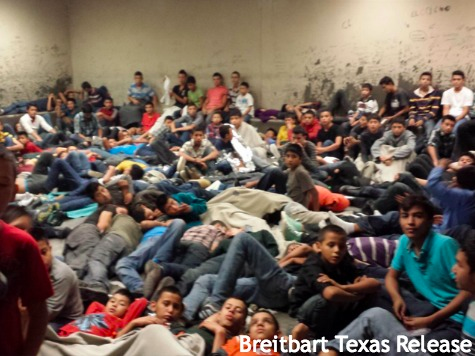The crisis at the southern U.S. border is an “existential” national security threat, according to the top general in charge in charge of overseeing the area.
“In comparison to other global threats, the near collapse of societies in the hemisphere with the associated drug and [undocumented immigrant] flow are frequently viewed to be of low importance,” Marine Corps Gen. John Kelly, who is responsible for the U.S. Southern Command, told Defense One. “Many argue these threats are not existential and do not challenge our national security. I disagree.”
According to Kelly, his forces have been unable to fully protect the U.S. from an influx of illegal drugs, weapons and people — indeed, as Defense One notes, since October more than 100,000 illegal immigrants have crossed the southern border into the United States. A majority of those entries have children, largely from El Salvador, Guatemala, and Honduras.
U.S. Southern Command is responsible for overseeing Defense Department security in Central, South America and the Caribbean Sea.
In February, Kelly told the House Armed Services Committee that budget cuts “severely limit” the military’s ability to secure the region. He added that the vulnerabilities could be manipulated by terrorists, describing a “crime-terror convergence” that are already being tapped by Lebanese Hezbollah sympathizers.
He further told a Senate panel in March that Southern Command is unable to pursue nearly 75 percent of suspected maritime trafficking — saying “I simply sit and watch it go by.”
The Commander noted to Defense One that a lot of the corruption and violence in the region is “directly or indirectly” fueled by “insatiable U.S. demand for drugs.”
In a plan to confront the crisis of unaccompanied illegal immigrant children last month, Democratic lawmakers pointed out “U.S. Southern Command (SOUTHCOM) is only sourced at five percent of the capacity it needs to carry out intelligence, surveillance, and reconnaissance (ISR) efforts crucial to disrupting illicit trafficking in and around Central America. As the lead federal institution for the detecting and monitoring of aerial and maritime trafficking of illicit drugs to the United States, SOUTHCOM must have access to the financial resources, as well as the maritime and aerial assets, it needs to carry out its mission.”
In recent week the Obama administration has laid out plans to confront the massive influx of illegal immigrant to the United States across the southern border — largely by unaccompanied minors — including funding for the Central American countries whose citizens are flooding into the U.S.
Kelly pointed to the violence in the immigrants home countries as a push factor sending them northward — saying of the countries he works with El Salvador, Honduras, and Guatemala are “far and away the worst off.”
“This region does not ask for much…. Some of my counterparts perceive that the United States is disengaging from the region and from the world in general,” Kelly told Defense One. “We should remember that our friends and allies are not the only ones watching our actions closely. …And in the meantime, drug traffickers, criminal networks, and other actors, unburdened by budget cuts, cancelled activities, and employee furloughs, will have the opportunity to exploit the partnership vacuum left by reduced U.S. military engagement.”

COMMENTS
Please let us know if you're having issues with commenting.